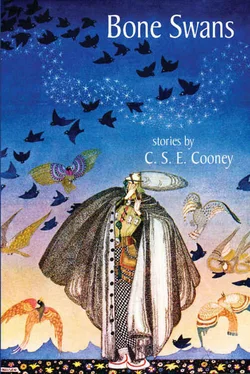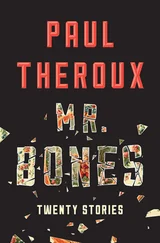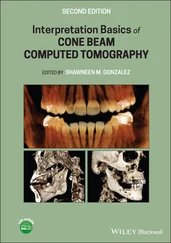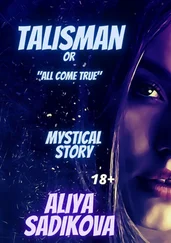“Flee!” cried the Flabberghast. “I will hold them off!”
Springing at the yawning purple maw that snapped with black piranha teeth, the Flabberghast raked its bulbous sides with his thin white hands. The balloon whipped around and pounced at his back, squeaking like a tricycle left too long out in the rain. Two more balloons joined it: one tiger-striped with the long neck of an ostrich, one with the face of a bear and the body of a snake.
Then— POP!
Tex had turned out his pockets of rocks and pointy bullet casings and began to bang that artillery— pop-pop-whap! —right into the polychromatic fray. Beatrice used to say how she bet Tex’d been a Junior League pitcher back in the olden days. He couldn’t rightly know either way, but ever since the world ended, his aim had just improved.
Diodiance unstrapped the thornstick from the loop on her belt, and— BLAM! WHAP! POP! —laid about her. Even Granny Two-Shoes jumped perch, snatching the switchblade from its sheath to thrust it up into the air. WHAP! POP! KERBLOOEY! Sheepdog Sal rose to her hind legs, lunging and gnashing with far greater gusto than any measly thin-skinned balloon beast. Pop! Pop! Wheeeeeeeze! went the whistling things as they rocketed away, deflating as they died.
Suddenly the air was still again. Gray and still. The cobblestones of Chuckle City were littered with rainbow skins. Diodiance whooped out the Barka Gang’s war cry and chanted, “Tex! Tex! Our boy’s the best! Fastest arm in the whole Midwest!”
Leaping up and down Main Street in those great gazelle arcs she’d learned in ballet, Diodiance hollered, “Jeté! Jeté! Tour jeté!” and landed back in front of them with a mighty ululation. Tex received her clap on the back with a sweaty grin, picking up his stones and bullet casings and pocketing them again. He caught Granny’s eye, who returned his gaze with blazing blue solemnity, and said, “Thanks for the warning, Granny Two-Shoes.”
Granny tugged at his camo cutoffs, shrugged, smiled. Her baby teeth were white as Diodiance’s tyranny and fluoride toothpaste could make them, except for the iron gray one in the middle. Dead at the root, Beatrice had said. The Rubberbabies did that, that time they took her for their slave.
“Hey!” Diodiance stopped dancing. “Where’s the Flabberghast anyway?”
“Who cares?” Tex muttered.
Granny Two-Shoes pointed down a street, where the Flabberghast crouched near a tiny ambulance. Balloon skins hung all about his person, making motley of his peacock coat. He appeared to be prodding something with his long fingers, which the Barka Gang, joining him, saw to be the painted head of a small clown. The rest of its body was crushed to death under the ambulance.
“Are you hopin’ the head’ll pop off?” Tex stiffened to kick him. “Gettin’ hungry, are you?”
“This is not a body. Not really. And I do not eat souls. It is forbidden.”
The Tall One almost sounded regretful. He tugged off his lawn cravat and used it to scrub the dead clown’s small face. Off came the ash. Off came the paint. Off came the singed red nose, the curly wig. The child was pale and bald, with sunken eyes the same gray as the sky. As everything.
“Leukemia,” the Flabberghast said. “From long before the slaprash. Here, you see? The ravages of her treatment? She’s been in the Big Bah-Ha awhile. It must have been a harsh death to keep her here so long, and then when the Gray Harlequin came, she found herself fixed. Like the rest of them. Insects on his corkboard. Poor little butterfly.”
His voice had dropped like he was talking to himself, but the Barkas leaned in, paying close attention. “Those underground said the situation here was dire, but the others did not heed their voices. They mocked me when I paced before the gates and worried. They called my frowns the best jest yet. But I was right to come when I did—no matter how questionable my methods.”
Granny Two-Shoes knelt beside him and closed the clown’s gray eyes. The Flabberghast smiled at her softly, teeth sparkling.
“You are a good girl, Granny Two-Shoes,” he said. “Would that you were a Tall One, and I could stay your friend forever.”
“Seems to me,” Tex grunted, “the dead shouldn’t have to die twice. Not like this—no death rite, no shrine, no gang to go and sing her final lullaby. It just seems wrong.”
Diodiance scowled. “Queen B’d call this whole darn place ice cream.”
Granny looked up sharply. Sheepdog Sal barked twice. Diodiance corrected herself. “Sorry. I mean obscene.”
“Beatrice would be perfectly correct.”
The Flabberghast stood up. The Tall One had never seemed so tall. The Barkas each thought, but did not say aloud, that the sky of the Big Bah-Ha might crack if he jumped.
“What happens when a child dies?” he asked them.
“Well, Flabby, you go and eat ’em.”
Diodiance jabbed Tex in the ribs. “Tex, that’s rude. He’s tryin’ to help us.”
“ We’re here to help him , you mean!”
The Flabberghast calmed her with a wave of his white hand. “Peace, Miss Diodiance. That is indeed what we do. We eat the bones. But what manner of being, one might ask, eats what’s left when the bones are gone? What kind of carrion monster eats the haeccitas ? The thisness of being? The soul?” He paused, and into his pause came the rushing of a hundred wings. Behind his slender shoulders a shadow moved across the sky, too fast and too low for a cloud.
“Gacy Boys,” he noted. Then, “How are your scabs, children?”
“Still runny,” said Diodiance. “Startin’ to scratch some at the edges. Queen B says that means healin’s a-comin’ close up, makin’ you itch.”
The Flabberghast nodded. “There is still time. But not much.” He pointed to the dead clown on the ground. “The Gacy Boys will try to take this little soul away and bring it where it will be devoured and lost to all memory. Will you let this happen?”
“No!” cried Tex and Diodiance as one. Sheepdog Sal growled. Granny Two-Shoes unsheathed her switchblade again.
“Then stand,” urged the Flabberghast as gray wings beat around them. “Let us drive these boybirds back to the sky and pursue where they flee. This is the beginning of the end.”
* * *
In a field at the edge of Chuckle City, two massive elephants danced. Rampant, they stood on the great columns of their hind legs, their forelegs rearing to create the crest of an archway. Two opposite pairs of flat feet pressed together, without a seam in the stone to show where one elephant ended and the other began. Ears flared like frozen wings. Tails neither hung straight down nor jerked erect, but seemed caught in a jaunty swish. Their long trunks met, entwining skyward like a single great tree. The inner curves of their hulking bodies supported a mirror.
Had it lain flat, Beatrice might have mistaken the mirror for a lake. Warped and rippled, smoky with age and fissures, the vast glass reflected nothing that stood at any distance from it.
“Where is the Gray Harlequin?” asked Beatrice. “Where are the Gacy Boys?”
Rosie Rightly clung to her elbow. “I don’t know, Bee-Bee. He’s always near here. He lives just outside the arch.”
Involuntarily, Beatrice remembered someone else who lived just outside a great stone arch. She would have shuddered, but the dread inside her could not make her flesh creep or her hair stand on end. I’m not really flesh anymore , she thought. My hair is just the memory of my hair.
“I never liked it here,” Rosie said, teeth chattering.
Beatrice wanted to tell Rosie that she was not really cold; she would never be cold again, but she held her tongue. My memory of a tongue , she corrected herself.
Читать дальше












